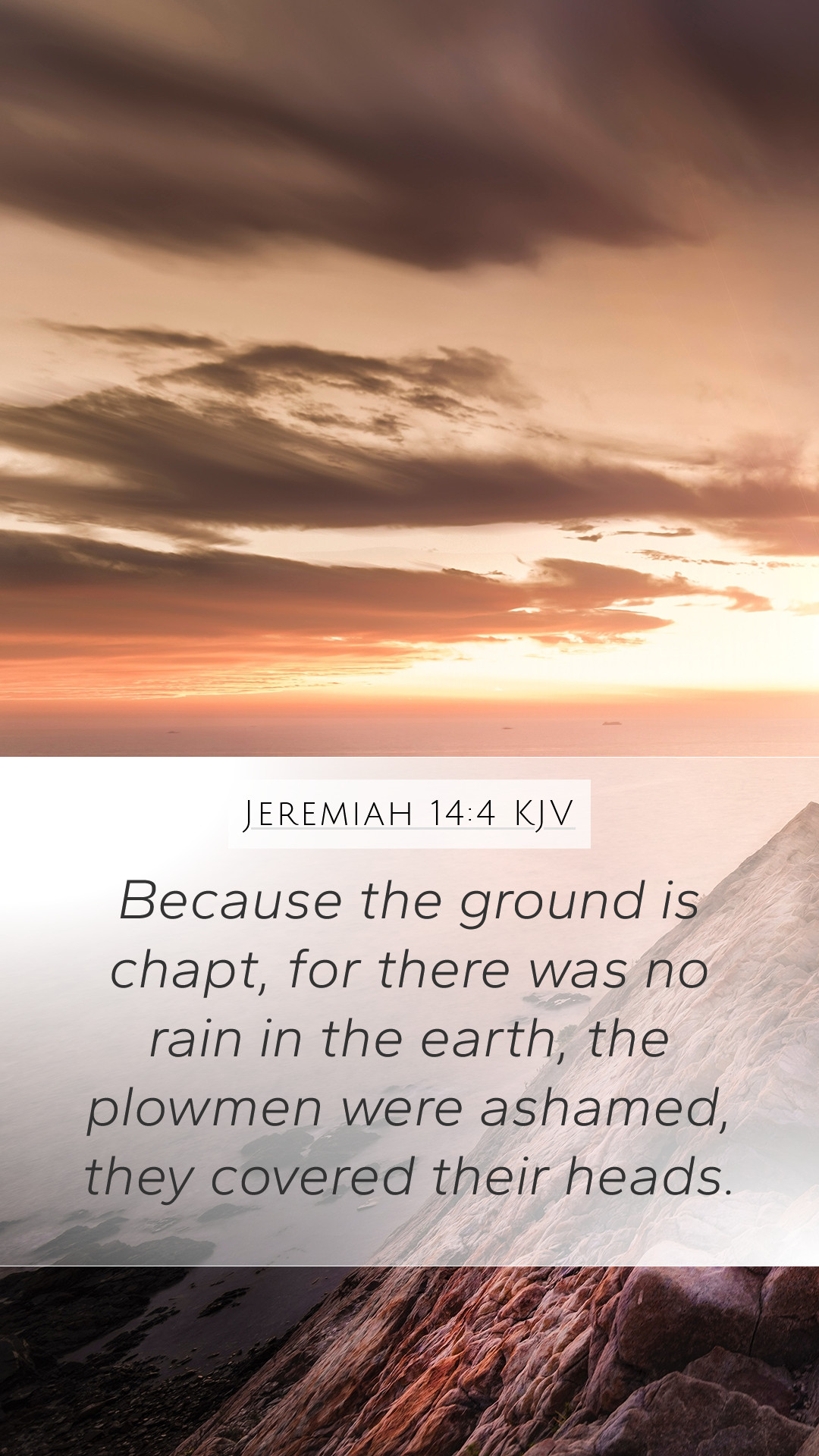Understanding Jeremiah 14:4 - Bible Verse Meanings and Interpretations
Jeremiah 14:4 states: "Because of the drought the inhabitants of Judah are in anguish; they mourn for
the ground, and the cry of Jerusalem goes up." This verse encapsulates the profound distress the people of Judah felt
due to a severe drought, representing not just a physical lack of water but also a spiritual desolation and longing
for God's mercy and intervention.
In this summary, we will explore various public domain commentaries by renowned theologians such as Matthew Henry,
Albert Barnes, and Adam Clarke to provide a comprehensive understanding of this biblical text, including its implications
and applications in contemporary life. This serves as a resource for those seeking in-depth Bible verse analysis and explanations.
Context and Background
The context of Jeremiah 14:4 is crucial to grasping its significance. Jeremiah, known as the "weeping prophet,"
ministered during a tumultuous period marked by political upheaval and spiritual decline. This chapter reflects a
time when Judah faced dire challenges, emphasizing the link between physical and spiritual droughts.
The drought mentioned in this verse symbolizes not just a lack of rain but also the people's distance from God. The
anguish of the land and its inhabitants serves as a reminder of the consequences of turning away from divine guidance.
Commentary Insights
Matthew Henry's Commentary
Matthew Henry underscores the severity of the drought in Judah, illustrating how it leads to despair among
the people. He notes that the "inhabitants of Judah" are not merely concerned about agricultural loss; their cries reflect
a deeper spiritual need. In his interpretation, this verse stresses the importance of recognizing the connection between
spiritual health and physical circumstances.
Albert Barnes' Notes on the Bible
Albert Barnes provides a detailed analysis of the social and ecological ramifications of drought. Barnes emphasizes
the collective mourning, indicating how drought affects the entire community and highlights the devastation that can
ensue when divine favor is withdrawn. He also draws attention to the prophetic nature of Jeremiah's warning,
linking it to the consequences of Judah’s disobedience.
Adam Clarke's Commentary
Adam Clarke brings forth the notion that the drought serves as a metaphor for spiritual barrenness. Clarke elaborates
on the desperation of the people who, recognizing their plight, turn to God in humility and pleading. His commentary
suggests that such situations prompt believers to seek restoration and dependence on God, illustrating a fundamental truth
about human need for divine provision.
Application for Today
As we analyze Jeremiah 14:4, it becomes evident that its meaning extends beyond historical context. In modern times,
individuals and communities grapple with various forms of hardship, whether physical, emotional, or spiritual.
The cry of the inhabitants of Judah can resonate with anyone facing adversity, reminding us of the importance
of turning to God in times of distress.
This verse encourages believers to reflect on their relationship with God and how spiritual droughts can mirror physical
challenges. It is an invitation to seek divine help and restoration, emphasizing that true satisfaction lies in dependence on
the Creator.
Cross References
- 2 Chronicles 7:13-14: Discusses the connection between seeking God and healing the land.
- Lamentations 4:9: Expresses the anguish of the people affected by famine and divine judgment.
- Isaiah 58:11: Clarifies God’s promise to guide and sustain those who act justly and seek Him.
Conclusion
Jeremiah 14:4 provides profound insights into the consequences of spiritual neglect and the human condition's
response to desperation. By studying this verse through various commentaries, we gain a broader view of its implications
for understanding scripture and personal application.
As we explore Bible verse meanings and interpretations, let this passage remind us to seek a deep and abiding
relationship with God, recognizing our dependence on His provision even amid life's most trying circumstances. Through
thorough Bible study insights, we can grasp the richness of scripture and apply its teachings to our daily lives.


